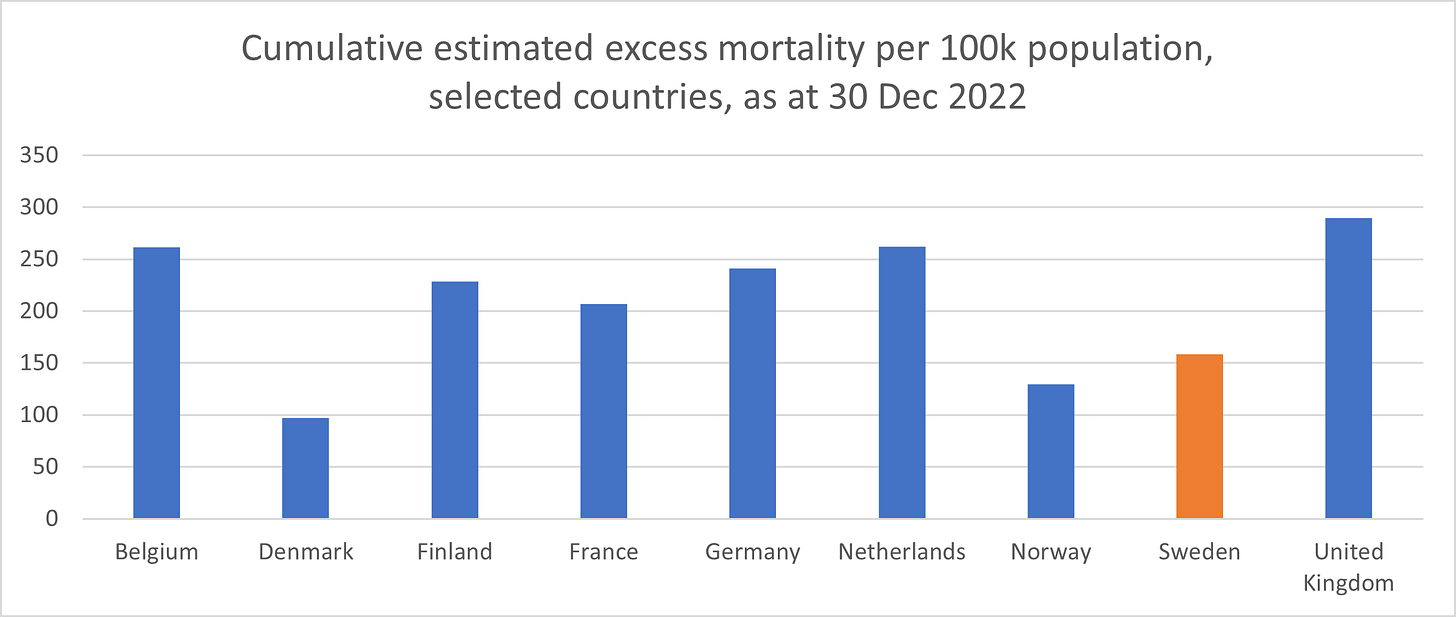The Swedish authorities were not completely “hands-off”. For a period, restaurants and bars were required to move to table service only, social gatherings of more than fifty people were banned, and high schools and universities were advised (but not ordered) to move to remote teaching where feasible. But primary schools remained open, businesses continued to function and the public were asked to act responsibly to limit spread, by staying home if symptomatic and generally taking care to avoid exposure. In short, it was a light-touch approach relying on people to take personal responsibility.

All masked up — ready for Covid and other hazards, November 2021. Dave Heatley
The early Swedish experience was unpromising
Covid swept through elder-care facilities with high fatality rates. Mr Tegnell and his light-touch strategy came under intense pressure from critics seeking a stronger response. As early as June 2020, the Swedish Government established a National Commission of Inquiry to review the country’s Covid response strategy. That “Corona Commission”, of 8 independent experts, reported in December 2020, again in September 2021, and finally in February 2022.
The Commission judged that the early response in Sweden was both slow and inadequate, and that more directive measures should have been implemented, especially to protect the vulnerable elderly.
Covid swept through elder-care facilities with high fatality rates. Mr Tegnell and his light-touch strategy came under intense pressure from critics seeking a stronger response. As early as June 2020, the Swedish Government established a National Commission of Inquiry to review the country’s Covid response strategy. That “Corona Commission”, of 8 independent experts, reported in December 2020, again in September 2021, and finally in February 2022.
The Commission judged that the early response in Sweden was both slow and inadequate, and that more directive measures should have been implemented, especially to protect the vulnerable elderly.
Fundamentally correct … with a more direct role for politicians
Responsibility for the pandemic response sat largely with the independent Swedish Public Health Agency and its epidemiologist Mr Tegnell. The inquiry faulted that model, making a number of points about inadequate pandemic preparedness, fragmented communication, and unclear lines of responsibility. It suggested a need for a more direct role for politicians, given the breadth and significance of the pandemic. However, in its final report, while retaining those points, the Commission endorsed the policy of avoiding widespread lockdowns as “fundamentally correct”.
Responsibility for the pandemic response sat largely with the independent Swedish Public Health Agency and its epidemiologist Mr Tegnell. The inquiry faulted that model, making a number of points about inadequate pandemic preparedness, fragmented communication, and unclear lines of responsibility. It suggested a need for a more direct role for politicians, given the breadth and significance of the pandemic. However, in its final report, while retaining those points, the Commission endorsed the policy of avoiding widespread lockdowns as “fundamentally correct”.
Assessing the Swedish “experiment”
With the passage of nearly three years since Covid first emerged, how does the Swedish strategy look by comparison with those adopted elsewhere within western European and other developed countries?
In April 2022, What Sweden Got Right About COVID appeared in the Washington Monthly, presenting data on Sweden’s Covid experience in international comparison. The article argued that, after two years, there was not much to suggest that Sweden’s response strategy was less effective than others in terms of measures such as excess mortality and Covid-related deaths.
1 Sweden then sat pretty much in the middle of the pack of wealthy Scandinavian and Western European countries. (And indeed it still does. Here is an updated graph of excess mortality to the end of 2022, see below for Covid-related deaths.)

Data source: The Economist’s Covid excess mortality model / Our world in data
With the passage of nearly three years since Covid first emerged, how does the Swedish strategy look by comparison with those adopted elsewhere within western European and other developed countries?
In April 2022, What Sweden Got Right About COVID appeared in the Washington Monthly, presenting data on Sweden’s Covid experience in international comparison. The article argued that, after two years, there was not much to suggest that Sweden’s response strategy was less effective than others in terms of measures such as excess mortality and Covid-related deaths.
1 Sweden then sat pretty much in the middle of the pack of wealthy Scandinavian and Western European countries. (And indeed it still does. Here is an updated graph of excess mortality to the end of 2022, see below for Covid-related deaths.)

Data source: The Economist’s Covid excess mortality model / Our world in data
Avoiding lockdowns was less damaging to wider social wellbeing
The Washington Monthly article argued that by avoiding widespread and prolonged lockdowns, disruption to Swedish society, particularly in areas of primary school education and wider social wellbeing, appears to have been less damaging than elsewhere.
In part prompted by that article, the Cato Institute, a Washington think-tank, held an online seminar in August 2022 in which expert reviewers offered views on the lessons available from the Swedish experience.
The key messages from the seminar were:

Data source: Our world in data
The Washington Monthly article argued that by avoiding widespread and prolonged lockdowns, disruption to Swedish society, particularly in areas of primary school education and wider social wellbeing, appears to have been less damaging than elsewhere.
In part prompted by that article, the Cato Institute, a Washington think-tank, held an online seminar in August 2022 in which expert reviewers offered views on the lessons available from the Swedish experience.
The key messages from the seminar were:
- After early bad experience with Covid, Swedish data on excess mortality and other measures of Covid impact look broadly comparable to those of its neighbours and the better performing Western European nations.

Data source: Our world in data
- Effective protection for the vulnerable and elderly is critical. Sweden was slow to achieve that.
- The experience for Swedish primary school students, both in terms of educational progress overall and, importantly, in terms of gaps in progress between socially advantaged and disadvantaged children, appears to be better than in other countries where schools were closed.
- Random factors can have a big influence on Covid infection rates across countries and regions – super-spreader events and “seed load” influences can drive very big differences in infection rates across regions. Sweden’s early bad experience may have been heavily influenced by the timing of a Stockholm school term break in late February 2020. Many families were holidaying at ski resorts in Northern Italy and Austria, where COVID was rife at the time. Neighbouring countries did not have school break at that time and were less directly exposed initially.
- Despite the early public controversy in Sweden about the light-touch policy response, current surveys in Sweden indicate that public confidence in health and public authorities remains high.
Murray Sherwin is a semi-retired economist - NZ Productivity Commission, Ministry of Agriculture and Forestry and RBNZ, amongst other gigs. This article was first published at Asymmetric Information, the Newsletter of the New Zealand Association of Economists (NZAE).


3 comments:
From a graph which appeared in the Dec Listener, and which I am told is accurate, the cumulative NZ rate is vastly lower.
Expecting responsible behaviour from the long civilised, cultured, eductaed and ordered mono cultural northern Europeans is very different from expecting the same from the dim, the contrary, the irresponsible, easy going, and citizens with other wprld views, as make up much of NZ society.
And not mentioned were the stupid. They are still actively spreading it around. Like one man who came to a wedding party in Hawke's Bay from Wellington where his wife was ill with Covid. He said "I tested negative before I left". The next week himself and half of the wedding party had Covid and so did their families. One stupid person can claim responsibilty for multiple infections but they're too stupid to work it out. If someone in your household has Covid, please stay away from crowds of people for a few days.
Also, if your partner is sick shouldn't you be there for them?
MC
The NZ inquiry is doomed in a very biased way before it even gets off the ground
The list of ‘you can’t investigate this’ is long and makes a mockery of ‘independence’
I know many many Swedish people and they openly scoff at parts of their enquiry.
Hello to Murray from Rod ex Te Awamutu
Post a Comment
Thank you for joining the discussion. Breaking Views welcomes respectful contributions that enrich the debate. Please ensure your comments are not defamatory, derogatory or disruptive. We appreciate your cooperation.